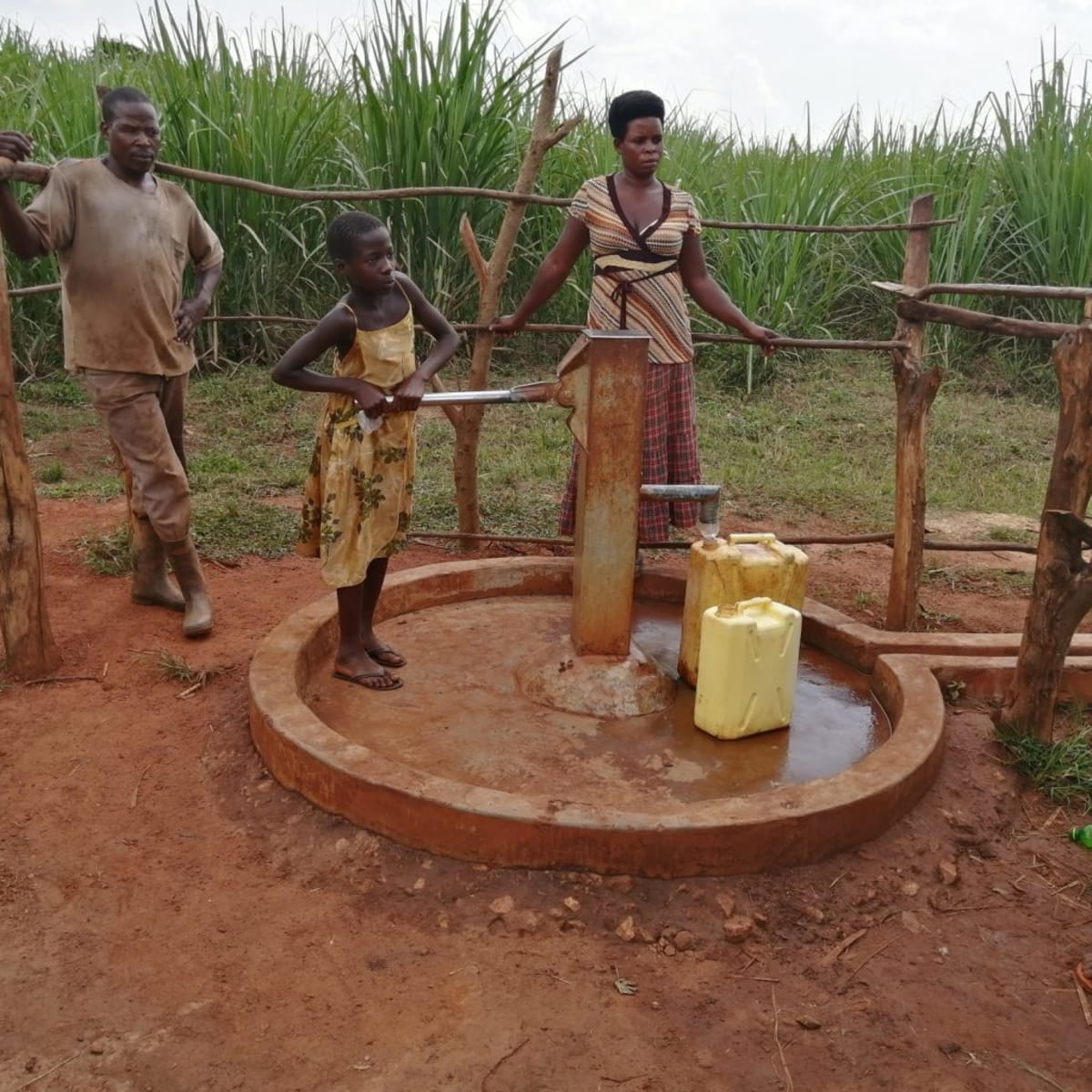A typical day in Kikube Nyabubale starts as the sun rises at 6am. The landscape is gently sloped into a valley with expansive sugarcane growing out to the East of the valley. Most of the peri-urban permanent houses are made of brick walls and iron sheet roofs, while the more rural areas have housing made of grass-thatched roofs and wattle wall.
The children prepare for school with the assistance of their mothers. The older males, including fathers, tether the livestock to graze and then proceed to the garden to work for a few hours. The older women help prepare the meal for the day. The children proceed to school and the women eventually join their spouses on the farm. Those who earn livelihoods from their businesses proceed to open their shops as early as 8am. They will tend to their crops over the weekend.
The majority of the families in the area grow sugarcane for sale to the Kinyara Sugar Corporation processing plant. This community has a moringa tree processing plant which employs more than 50 residents from the community. Some people will work there or as casual laborers in the sugar factory. And there are others who engage in petty trading at the nearby business centers.
Families farm until 2pm and return home. At this point, the women commence home chores such as fetching water, cleaning, and cooking, whilst the men take a rest under shade. Lunch takes place before 3pm after which the men and women return to work on the farm. On Fridays, the afternoons are spent selling excess crops and other items in the local market.
There is a borehole in a nearby trading center about 1 kilometer away and a shallow drilled well about 1.2 kilometer away. Both sources are mismanaged, according to our teams. The borehole is used by a lot of people and breaks down often. The shallow well does not have a use problem, but it is open to contamination due to poor sanitation in its immediate vicinity.
For this community, the protected wells are a long distance away and there is queuing given the high number of users for the water point in the trading center. This means people spend a lot of time fetching water each day, such as Margret Nyamahunge. The mother of seven children leaves each morning after sending the children to school in order to get water from the well located one kilometer away from her home. Between the walk and the time waiting in line, she often does not get home until 10 am.
"I have to prepare some food for my 2-year-old and those returning from school before proceeding to the garden late in the morning hours," she explained. "This tires me so much. I also miss out productive time on the farm from the exhaustion experienced.
For 72-year-old Beatrice Nyamaizi, 90 minutes of each day are spent fetching water. It is a struggle for her to have water consistently available at her home because of the toll it takes on her body to get water. She relies on her grandson Nerbert to help when he is home, but he is not always there.
"I worry a lot about my grandmother and how she copes with the situation of water when I am not around," Nerbert said.
Here’s what we’re going to do about it:
New Hand-Dug Well
With the guidance of our artisans and mechanics, the excavated well will be cased, sealed with a well pad, and then finished with a new Consallen pump. The community will participate in excavating and constructing the water source.
Excavation takes a month or more on average, depending on the nature of the rock beneath. Construction of the well lining and installation of the pump takes on average 12 days.
This well will be located in Kikube Nyabubale Community and will bring clean water closer to families having to walk long distances for their water.
Improved Sanitation
The aim is that all households own an improved latrine. It's estimated that fewer than 30% of the households have their own latrines, with 40% of latrines shared between two families and 30% by more than two households. In addition, none of the latrines have dedicated handwashing facility.
Many households do not use a latrine but use the bush. Due to open defecation, feces are spread all over the village. This leads to waterborne diseases and contamination of groundwater and surface water. Our aim is that the community is able to live a healthy life free of preventable diseases. We endeavor that at the end of our presence in the community, people will have both access to sustainable, clean water and access to sanitation. We have now organized families to form digging groups for latrine construction, and empowered them with tools to use.
Training
Training’s main objectives are the use of latrines and observing proper hygiene practices since these goals are inherently connected to the provision of clean water. Open defecation, water storage in unclean containers and the absence of handwashing are all possible contaminants of a household water supply. Each participating village must achieve Open Defecation Free status (defined by one latrine per household), prior to the pump installation for a shallow hand-dug well.
This social program includes the assignment of one Community Development Officer (CDO) to each village. The CDO encourages each household to build an ideal homestead that includes: a latrine, handwashing facility, a separate structure for animals, rubbish pit and drying rack for dishes.
We also implement the Community Led Total Sanitation (CLTS) approach with each of our village partners. This aims to improve the sanitation and hygiene practices and behaviors of a village. During these sessions, village leaders naturally emerge and push the community to realize that the current practices of individual households – particularly the practice of open defecation– are not only unhealthy but affect the entire village. CLTS facilitates a process in which community members realize the negative consequences of their current water, sanitation and hygiene behaviors and are inspired to take action. Group interactions are frequent motivators for individual households to build latrines, use the latrines and demand that other households do the same.

 Protected Dug Well
Protected Dug Well
 Rehabilitation Project
Rehabilitation Project






























